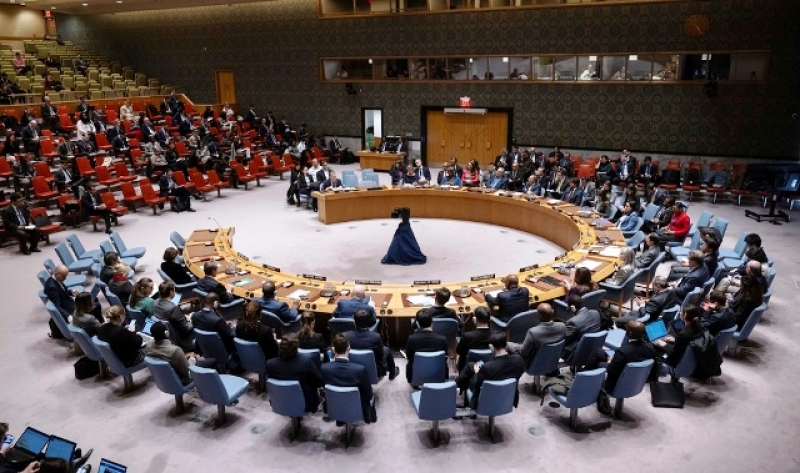- BNP govt to take office with economy at a crossroads |
- Pahela Falgun brings colour, music as spring begins |
- New MPs, cabinet members to be sworn in Tuesday |
- Mamata sends sweets, flowers to Tarique Rahman |
UNSC demands Yemen rebels halt attacks on ships in ME waters

UN Security Council in session.
UNITED NATIONS, Jun 28 (AP/UNB) — The U.N. Security Council on Thursday approved a resolution demanding Yemen’s Houthi rebels halt all attacks on ships and urged that the disruption to maritime security in a critical Middle East waterway be urgently addressed.
The resolution made no mention that the Iran-backed rebels claim they are staging the attacks because of the Israel-Hamas war in Gaza.
The resolution, which also extended the requirement that U.N. Secretary-General Antonio Guterres report monthly on the Houthi attacks in the Red Sea and the Gulf of Aden, was approved by a 12-0 vote, with Russia, China and Algeria abstaining.
Shipping has reduced drastically through the route crucial to Asian, Middle East and European markets in a campaign the Houthis say will continue as long as the war rages in the Gaza Strip.
The resolution condemns the Houthis’ continuing attacks, which the rebels say are aimed at ending the war in Gaza, now in its ninth month — emphasizing the need to address root causes, “including the conflicts contributing to regional tensions and the disruption to maritime security."
Sparked by Hamas’ surprise attack on Oct. 7 in which the militants stormed into southern Israel, killing about 1,200 people and taking some 250 hostage, the war has so far killed over 37,000 Palestinians, according to Gaza's Health Ministry, which doesn’t distinguish between civilians and combatants.
The Houthis have targeted more than 60 vessels in the waterway, firing missiles and drones. Four sailors have been killed, one vessel was seized and two others have been sunk in Rebel attacks since November.
The Houthis maintain they target ships linked to Israel, the United States or Britain. However, many of the vessels attacked have little or no connection to the Israel-Hamas war — including some bound for Iran.
In response, a U.S.-led airstrike campaign has targeted the Houthis since January, including a series of strikes on May 30 that killed at least 16 people and wounded 42, according to the rebels.
Yemen has been engulfed in civil war since 2014, when the Houthis seized much of northern Yemen and forced he internationally recognized government to flee from the capital, Sanaa. A Saudi-led coalition intervened the following year in support of government forces, and in time the conflict turned into a proxy war between Saudi Arabia and Iran.
Though fighting has decreased considerably since a six-month truce in 2022, the war has devastated the Arab region’s poorest country and created one of the world’s worst humanitarian disasters.
Thursday's resolution, which was a follow-up resolution to one adopted Jan. 10 that condemned and demanded an immediate halt to Houthi attacks, “urges caution and restraint to avoid further escalation of the situation in the Red Sea and the broader region.”
Speaking on behalf of the United States and Japan, which sponsored the resolution, U.S. deputy ambassador Robert Wood said after Thursday's vote that the Houthi attacks “threaten international peace and security” and that they are “a global challenge” that "necessitates a global solution."
"With this resolution the council once again sends a clear message to the Houthis: Cease these attacks immediately,” he said.
He stressed the need to deprive the Houthis of weapons, noting that the resolution reiterates all countries are required to implement a 2015 U.N. arms embargo on Houthis and others undermining Yemen’s stability.
Russia’s deputy ambassador Anna Evstigneeva said Moscow supports the safety of navigation in the Red Sea and other waters adjacent to Yemen, but she accused the “so-called U.S. coalition” of using the January resolution to justify its attacks on the Houthis.
“We urge all participants in the coalition to immediately halt illegal attacks and to transition to political and diplomatic means to reduce tensions in the waters adjacent to Yemen,” Evstigneeva said.
China’s deputy U.N. ambassador Geng Shuang said Beijing has repeatedly called on the Houthis to end their attacks on commercial ships but abstained as it did in January because some key elements in the resolution “could have negative consequences and lead to further escalation of regional tensions.”
He pointed to actions by “certain countries” against Yemen that have not only killed civilians and damaged infrastructure, “but also heightened security risks in the Red Sea waters.”
An immediate and lasting cease-fire in Gaza “will help cool down the situation in Yemen and the Red Sea,” Geng said.

